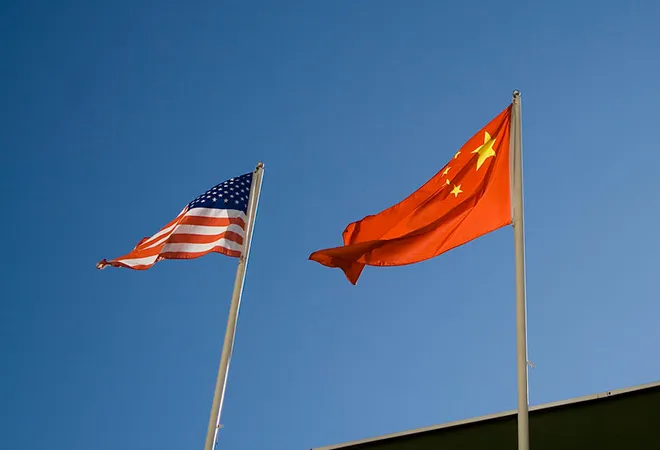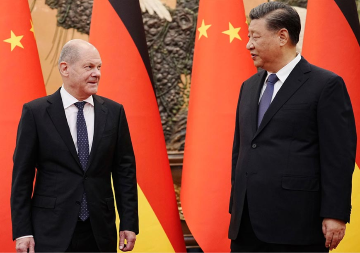
The
heated public encounter between Chinese and US diplomats at their first meeting since President Joe Biden came to office provides a measure of impending turbulence that will likely increase with time.
The theatrical exchange in Alaska as Secretary of State, Antony Blinken, and National Security Advisor, Jake Sullivan, faced Yang Jiechi, Chinese Communist Party’s foreign affairs chief, and Wang Yi, China’s foreign minister, was undiplomatic, unstructured and an obvious departure from convention.
Chinese officials may have been extra “wolf”- like because their meeting came after a careful American symphony with allies and partners, including a convening of the first Quad summit, carrying the same message — a web to constrain China is a much-desired goal of key countries.
Yang and Wang had to make a loud announcement of Chinese confidence and arrival. Yang’s 17-minute jeremiad on the frailties of American society in response to a short statement by Blinken was aimed more at his domestic audience and at other countries watching the show. It was meant to signal that China now considers itself equal to the United States.
Yang and Wang had to make a loud announcement of Chinese confidence and arrival.
Yang’s
frontal verbal assault in Alaska on camera also means wolf warrior diplomacy will continue to define China’s public posture in the intensifying superpower competition and shape the international landscape for some time to come.
The message: “China is here” and is ready to counter Biden’s “America is back” package. This new China under President Xi Jinping is unapologetic and combative. Yang’s “performance art” gave a clear sense that the Chinese think America’s best days are over. At least, that’s the story line Beijing wants to sell to the rest.
If Beijing avoided giving concessions before by wrapping the Americans in endless talks and limiting wolf warrior tactics to occasional private displays, now it is signaling a complete refusal to discuss “red line” issues of human rights, Hong Kong, Taiwan and Tibet despite US sanctions — some of them announced just before the Alaska meeting to show American intent.
Prospects for a “reset” in US-China relations — a hope harboured by Beijing after the Trump Administration’s aggressive stance — have dimmed considerably after the two-day meet and greet. Blinken left Anchorage
saying, “We were clear-eyed coming in, we’re clear-eyed coming out” and that consultations with allies and partners on the way forward would continue.
Yang’s “performance art” gave a clear sense that the Chinese think America’s best days are over. At least, that’s the story line Beijing wants to sell to the rest.
Relations between the reigning superpower and the aspiring one will be antagonistic and the rest of the world will have to navigate — sometimes delicately, sometimes openly. That the Biden Administration has essentially continued with Trump Administration policies on China will deepen the competition, especially in the realm of security.
Given the events in Alaska, a few questions arise about American strategy, expectations and the calculations made to schedule a meeting so early in the administration and before enough leverage had been built. A meeting conducted merely to state the US position on a gamut of contentious issues didn’t seem to provide any discernable advantage.
Instead, the Chinese got an easy opportunity to play to the gallery and treat Blinken and Sullivan with contempt. Same results — of stating positions — could have been achieved with an email exchange and avoided the public showdown. Did Team Biden get lured into a meeting without a bigger game plan beyond consultations with allies and partners? Surely, a public lecture from the Chinese is not what they wanted.
A meeting after the administration’s China policy review was completed in the summer might have worked better, especially if the review is to reveal new strategies aimed at constraining China’s aggressive moves. Keeping the Chinese waiting and guessing for months would have been a good tactic by itself.
Keeping the Chinese waiting and guessing for months would have been a good tactic by itself.
The Biden Administration also has a special responsibility to establish that it’s not another version of the Obama Administration, which did little to push China back from its agenda of consolidation and expansion. The Chinese are playing the same game again.
In Alaska, they were clearly testing a Leninism they believe in: “Probe with bayonets. If you encounter mush, proceed; if you encounter steel, withdraw.” Did Yang and Wang encounter mush or steel?
Blinken and Sullivan were on point and clear in their articulation of how they see Chinese excesses whether territorial or technological. But at the same time their Chinese adversaries can see that Europe’s big players are already singing a different song, something, which Beijing ensured they would before Biden came to office.
Germany and France have shown they are unwilling to sacrifice profits in China even if their official explanation blames structural changes underway in America. In their calculation, if the Americans can vote for Donald Trump once, they can vote for him again or someone like him. They see reasons for such a possibility and for hedging.
Did the Biden team put too much faith in starting anew with key European partners and assuming a few rounds of consultations would undo the damage of the last four years?
But the Europeans ignore the strong bipartisan consensus in the US Congress on China-related issues. Did the Biden team put too much faith in starting anew with key European partners and assuming a few rounds of consultations would undo the damage of the last four years?
Yang and Wang know the vulnerabilities. Some of their confidence and arrogance comes from having studied their subjects well and recognised the pressure points. In Alaska, they used the knowledge to full advantage.
The views expressed above belong to the author(s). ORF research and analyses now available on Telegram! Click here to access our curated content — blogs, longforms and interviews.



 The
The  PREV
PREV


